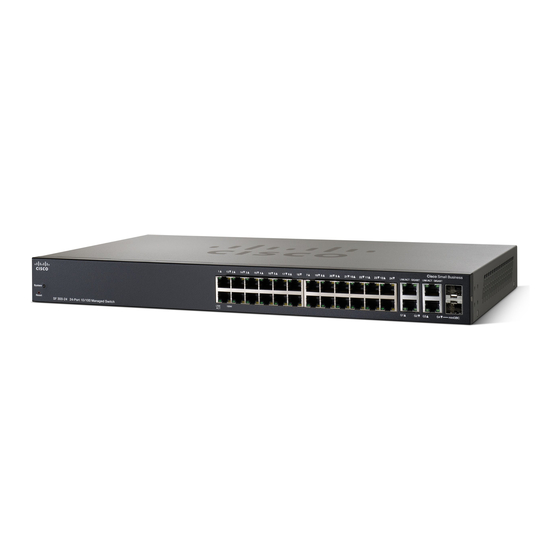Cisco 300 Series Manual de início rápido - Página 10
Procurar online ou descarregar pdf Manual de início rápido para Interruptor Cisco 300 Series. Cisco 300 Series 18 páginas. Managed switches
Também para Cisco 300 Series: Ficha de dados (14 páginas), Manual de início rápido (17 páginas), Manual de início rápido (17 páginas)

- 1. Quick Start Guide
- 2. Mounting the Cisco Switch
- 3. Rack-Mount Placement
- 4. Wall Mounting
- 5. Connecting Network Devices
- 6. Power over Ethernet (Poe) Considerations
- 7. Troubleshoot Your Connection
- 8. Front Panel Ports
- 9. Reset Button
- 10. Back Panel
- 11. Front Panel Leds
- 12. Returning the Device to the Factory Default Settings
- 13. Where to Go from here
•
8 data bits
•
no parity
•
1 stop bit
•
no flow control
Enter a user name and password. User names and passwords are
S
4
TEP
both case sensitive and alpha-numeric. The default username is
cisco, and the default password is cisco.
If this is the first time that you have logged on with the default
S
5
TEP
username and password, the following message appears:
Please change your password from the default
settings. Please change the password for better
protection of your network. Do you want to change
the password (Y/N) [Y]?
Select Y, and enter a new administrator password.
S
6
TEP
Make sure that any configuration changes are saved before
C
AUTION
exiting by issuing the command:
copy running-config startup-config
You are now ready to configure the switch. Refer to the Cisco 300 Series
Managed Switch Administration Guide for further information.
If you are not using DHCP on your network, set the IP address type
N
OTE
on the switch to Static and change the static IP address and subnet
mask to match your network topology. Failure to do so may result in
multiple switches using the same factory default IP address of
192.168.1.254.
Troubleshoot Your Connection
If you cannot access your switch from the web-based interface, the switch
may not be reachable from your computer. You can test network
connections by using ping on a computer running Windows:
Open a command window by using Start > Run and enter cmd.
S
1
TEP
At the Command window prompt enter ping and the managed
S
2
TEP
switch IP address. For example ping 192.168.1.254 (the
default static IP address of the managed switch).
If you can reach the switch, you should get a reply similar to the
following:
10
Cisco 300 Series Managed Switches
